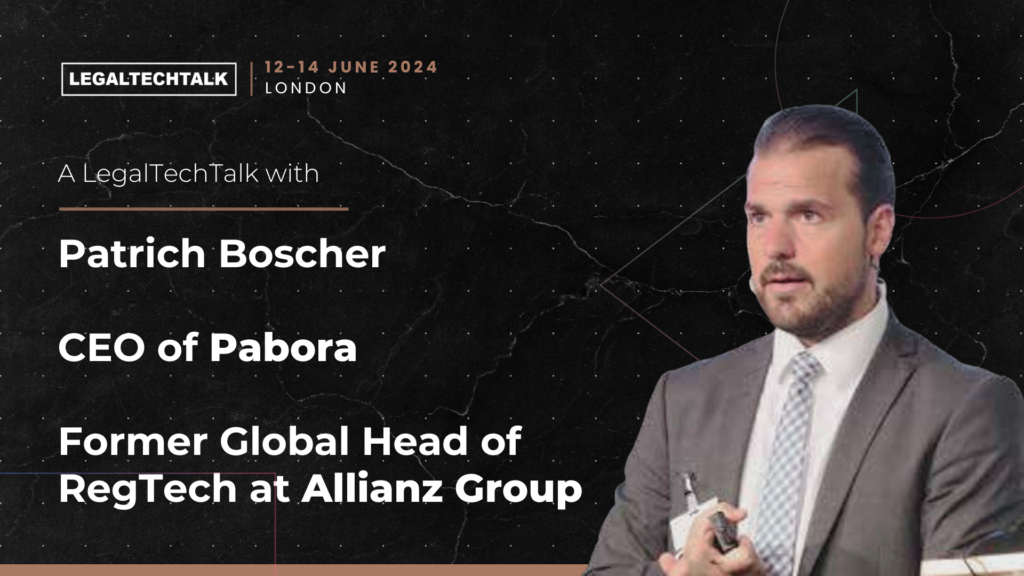In this interview, Patrick Boscher, CEO of Pabora (former Global Head of RegTech at Allianz Group) shares insights on the evolving compliance landscape, emphasising technology’s growing role, data privacy, and a proactive approach. We discuss regulatory sandboxes, ESG integration, and the future’s exciting prospects, including generative AI. Patrick offers valuable advice for RegTech startups aiming to collaborate with compliance leaders. Continue reading for a concise look at the future of regulatory compliance.
Bradley Collins: Hi Patrick, it’s great to reconnect with you. Since we last spoke, how has the landscape of regulatory compliance evolved?
Patrick Boscher: It’s a delight to catch up again. The world of regulatory compliance has undergone a substantial transformation. As global and local regulations continue to evolve at a rapid clip, technology (SupTech) has empowered regulatory bodies to step up their scrutiny, leading to more frequent enforcement actions. It’s become abundantly clear that monitoring these regulatory changes and enforcement actions is not just a necessity, but a vital element of compliance. We’ve also seen a significant surge in emphasis on data privacy and cybersecurity.
This shift has nudged the industry towards adopting more sophisticated technological solutions to enhance compliance reporting and monitoring. Yet, the transformation isn’t limited to technology adoption. We’ve been gravitating towards a more proactive, risk-based approach to compliance, leveraging technology to preemptively spot and manage potential risks.
The introduction of regulatory sandboxes has also begun fostering stronger collaboration between regulatory bodies, RegTech startups, and the industry in addressing emerging challenges together. And let’s not overlook the rising focus on Environmental, Social, and Governance (ESG) factors. As ethics, culture, and governance become progressively crucial, we’re noticing their integration into compliance frameworks.
Bradley Collins: Indeed, it seems to be a dynamic period for regulatory compliance. Given these shifts, what transformations do you anticipate in the near future?
Patrick Boscher: I’m convinced we’re steering towards a future where technology takes the center stage in regulatory compliance, as I’ve always believed. Digital transformation will persist in molding our industry. We’re likely to see emerging technologies such as generative AI – akin to what powers ChatGPT – become more prevalent as we aim to streamline compliance processes. Simultaneously, the world is growing increasingly conscious of environmental and social responsibilities.
Thus, I foresee a ramped-up focus on ESG factors, with technology playing a pivotal role in managing this complex area. Moreover, with the expansion of FinTech and digital banking sectors, consumer protection is poised to take the limelight. We can expect to see more regulations in these sectors. Data privacy and protection will continue to develop. Most companies are already well-equipped, albeit mainly with manual processes. So, automation will be a crucial component of this evolution as soon as budgets are available.
And as always, the primary attention will stay on antimoney laundering and counter-terrorism financing regulations. We already see regulatory amendments focusing on cryptocurrencies and digital assets such as NFTs.
Bradley Collins: Interesting predictions, Patrick. What guidance would you offer to RegTech startups looking to collaborate with enterprise compliance leaders?
Patrick Boscher: To the RegTech startups out there, I urge you to delve into the intricacies of the industries you’re targeting, and focus on specific target groups, not all at once. Understand the challenges your target groups really (!) face and fine-tune your solution to address these specific pain points. Establishing trust is paramount. Demonstrate to them that you understand both their business and the regulatory requirements, and show that you can provide expertise, which will foster credibility. A great idea backed by excellent tech doesn’t solve the problem.
You need team members with actual compliance experience. Seek partnerships with industry associations and regulatory bodies. Such alliances not only bolster your credibility but also lend validation to your solution. Ensure your solution is adaptable, aligns with industry standards, and is equipped to handle diverse compliance requirements. Assist your clients in creating a robust business case – they often struggle to quantify the benefits, but a decision-maker needs a compelling rationale to give the go-ahead.
Key Takeaways:
1: Embrace technology and proactivity in compliance. Stay updated on evolving regulations, prioritise data privacy, and leverage technology for more sophisticated compliance reporting and monitoring. Adopt a proactive, risk-based approach to compliance, using technology to preemptively identify and manage potential risks.
2: Prepare for future trends. Anticipate the increasing role of technology in compliance, including the use of emerging technologies like generative AI. Focus on Environmental, Social, and Governance (ESG) factors, prepare for additional regulations in FinTech and digital banking, and prioritise data privacy and automation.
3: Advice for RegTech startups. Delve into specific industries, understand their unique challenges, and tailor your solution to address specific pain points. Build trust by demonstrating expertise and compliance knowledge. Form partnerships with industry associations and regulatory bodies to enhance credibility. Ensure your solution aligns with industry standards and is adaptable to diverse compliance requirements. Assist clients in creating a compelling business case to secure buy-in.








